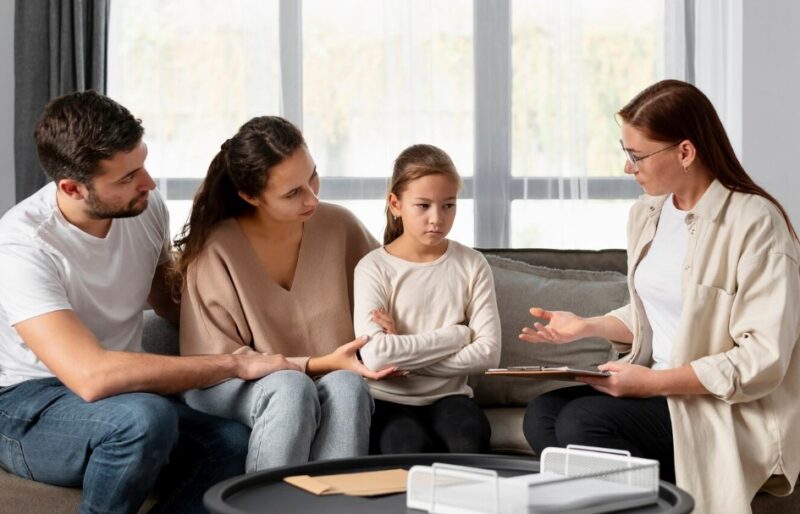Co-parenting after divorce brings challenges that demand patience, communication, and smart decision-making. When tensions escalate, minor issues can snowball into costly legal battles. The goal is not just to stay civil but to protect your child’s wellbeing and your own peace of mind.
Below are strategies that reduce the risk of conflict and help divorced parents work together effectively. The sooner you adopt these habits, the smoother your co-parenting relationship becomes.
Key Highlights
- Clear boundaries prevent confusion and reduce emotional tension.
- Consistency in parenting builds trust between co-parents.
- Written agreements reduce legal risk and miscommunication.
- Neutral communication tools help avoid emotional confrontations.
- Involvement of family lawyers gives structure and clarity when needed.
- Child-focused decision-making lowers conflict and supports development.
Set Firm Boundaries and Respect Roles

Clear boundaries stop small misunderstandings from spiraling into bigger issues. You no longer live together, but you’re both still responsible for parenting. Mixing personal and parental roles causes confusion.
Each parent must respect the other’s time with the child. Drop-offs, holidays, and schedules must be kept predictable. This keeps children emotionally stable and gives each parent clarity.
Don’t offer opinions about the other parent’s personal life. It’s not your place anymore. Avoiding overreach lowers emotional tension and builds a cleaner structure that minimizes conflict.
Use Written Agreements for Clarity
Verbal agreements often break down. Memories fade, and assumptions take over. That leads to arguments—and worse, legal threats.
Always put agreements in writing. You don’t need to run to court each time, but a shared digital calendar or co-parenting app helps. Discuss key issues like:
- Weekly schedules
- Holidays and school breaks
- Health care responsibilities
- Decision-making for school and extracurriculars
When issues get complex, or if one parent refuses to cooperate, outside help becomes necessary. That’s where experienced family lawyers make a difference. Kabir Family Law offers tailored guidance with a deep understanding of divorce and co-parenting dynamics. They help you navigate disputes, enforce agreements, and protect your child’s stability. Legal professionals who focus on family issues know how to steer parents through conflict without dragging everyone into court unnecessarily.

Communicate in a Neutral, Businesslike Way
Emotions still run high after a divorce. But angry texts or sarcastic comments don’t help anyone. Think of your co-parenting relationship like a professional partnership. Keep communication focused on the child, and avoid discussing old problems.
Use tools like:
- Shared calendars
- Co-parenting apps such as OurFamilyWizard or TalkingParents
Avoid in-person arguments or phone calls if they tend to lead to conflict. Written messages give space to think before reacting and reduce the chances of miscommunication. Stay brief, factual, and polite.
Try This Communication Checklist:
- Is your message focused on the child?
- Does it avoid personal attacks?
- Could your tone be misunderstood?
If in doubt, rewrite the message. Think long-term. Every fight leaves emotional fallout for your child.
Stay Consistent on Rules and Routines
Consistency matters. Your child needs predictability. If one parent allows late bedtimes, skipped homework, or different discipline rules, the child becomes confused. This leads to tension between parents and stress for the child.
Coordinate basic rules:
- Bedtimes
- Screen time
- Meal routines
- Chores and responsibilities
- Homework expectations
You don’t need identical parenting styles. But aim for alignment on key points. Even small cooperation efforts like matching bedtime routines across households create a sense of security for your child.
Keep Your Child at the Center, Not in the Middle

Some divorced parents use children as messengers. Others let kids witness arguments. Both cause emotional harm. Your child didn’t choose the divorce, and shouldn’t suffer for it.
Talk directly with your co-parent. Never ask your child to pass on messages. Don’t interrogate them about the other household. That only fuels mistrust.
Instead, focus on what your child needs:
- Stability
- Love from both parents
- A calm environment
Decisions should reflect your child’s best interests, not your personal preferences or frustrations with your ex. If both parents hold this focus, the chance of legal battles shrinks dramatically.
Know When to Involve Legal Help
You can’t control the other parent. If they stop cooperating or breach agreements, you need outside support. Avoid long arguments that go nowhere. In some cases, an experienced legal specialist can step in to resolve disputes quickly and fairly.
Family law professionals help interpret agreements, enforce parenting plans, and keep the child’s welfare front and center. Delaying legal advice often makes the situation worse and more expensive later on.
If you face:
- Persistent schedule violations
- Denied visitation
- Major decisions without your input
- Financial disagreements around child support
…then it’s time to consult a lawyer.
Final Thoughts
Co-parenting after divorce can be messy. But it doesn’t have to be a battlefield. Structure, consistency, and clear communication are your best defenses against conflict. When things break down, don’t wait. Talk to professionals who understand family dynamics.
The sooner you create a stable, respectful co-parenting setup, the better it is for everyone—especially your child.
Let each decision pass this test:
Does this help my child grow up in a calm, loving, and balanced environment?
If the answer is yes, you’re on the right path.


